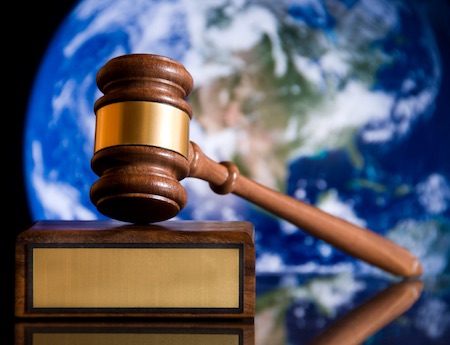Copyright Office, DOJ Sued Over Implementing DMCA

The smarter way to stay on top of broadcasting and cable industry. Sign up below
You are now subscribed
Your newsletter sign-up was successful
The Electronic Frontier Foundation is suing the Copyright Office and the Justice Department over the Digital Millennium Copyright Act (DMCA).
The suit, filed in the D.C. District Court, is challenging anti-circumvention and anti-trafficking provisions of the DMCA (Sec. 1201, 1203 and 1204 of the act), which prohibit circumventing software that content companies like TV and movie studios argue protects their valuable intellectual property from piracy and fair use fans say "restrict access to lawfully-purchased copyrighted material... even where people want to make noninfringing fair uses of the materials they are accessing."
"The threat of enforcement of these provisions chills protected and noninfringing speech that relies on copyrighted works, including independent technical research into computer security systems and the discussion of that research, and accessing copyrighted works in order to shift the content to a different format, space, or time," the suit alleges.
The office conducts reviews of requests for exemptions from copyright protections for "innovation, free expression and other public interests." But EFF is alleging that the office has been routinely failing to grant valid fair use copyright exemptions from the anti-circumvention.
EFF is representing a couple of plaintiffs in the suite. One is working on a device to edit digital video streams for potential remixes and other uses and the other is a computer security researcher.
“The government cannot broadly ban protected speech and then grant a government official excessive discretion to pick what speech will be permitted, particularly when the rulemaking process is so onerous,” said EFF.
“This suit highlights fundamental failures by the Copyright Office in the DMCA exemption process. The Office has erected a litany of administrative barriers, not required by the law itself, to scholars, technologists, consumers, and many others ensnared by unintended consequences and indefensible applications of Section 1201," said Kerry Maeve Sheehan, policy fellow for fair use advocates Public Knowledge. "Even when the Copyright Office does recommend exemptions, they are often so narrow as to be practically useless. In light of the Copyright Office’s mismanagement, this constitutional challenge is hardly surprising."
The smarter way to stay on top of broadcasting and cable industry. Sign up below
(Photo via Tori Rector's Flickr. Image taken on July 21, 2016 and used per Creative Commons 2.0 license. The photo was cropped to fit 3x4 aspect ratio.)
Contributing editor John Eggerton has been an editor and/or writer on media regulation, legislation and policy for over four decades, including covering the FCC, FTC, Congress, the major media trade associations, and the federal courts. In addition to Multichannel News and Broadcasting + Cable, his work has appeared in Radio World, TV Technology, TV Fax, This Week in Consumer Electronics, Variety and the Encyclopedia Britannica.

